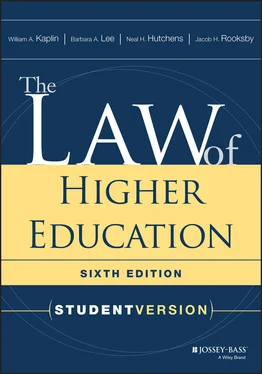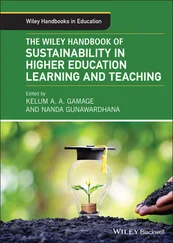Like the Feldman court, most contemporary courts will recognize that they should accord deference to the academic decisions of academic institutions with regard to faculty personnel matters. But seldom are courts as outspoken on this point as was the court in Feldman . Other courts, moreover, may (and should) give more attention than the Feldman court to whether the decision being challenged was a genuinely academic decision, based on expert review of professional qualifications and performance.
There are also many statutory employment discrimination cases in which courts defer substantially to the faculty personnel judgments of colleges and universities (see generally Section 5.4of this book), sometimes with language as striking as that in the Feldman opinion (see, for example, Kyriakopoulos v. George Washington University , 657 F. Supp. 1525, 1529 (1987)). But this does not mean that courts will, or should, defer broadly in all or most cases challenging faculty personnel decisions. There have been and will continue to be cases where countervailing considerations counsel against deference—for example, cases where there is evidence that an institution has relied on race, ethnicity, or gender in making an adverse personnel judgment; or where an institution has relied on personal animosity or bias, internal politics, or other nonacademic factors; or where an institution has declined to afford the faculty member procedural safeguards; or where a decision for the plaintiff would not significantly intrude on university decision makers' ability to apply their expertise and discretion in making personnel decisions. The court in Kunda v. Muhlenberg College , above, strikes the right note about such situations:
The fact that the discrimination in this case took place in an academic rather than commercial setting does not permit the court to abdicate its responsibility… Congress did not intend that those institutions which employ persons who work primarily with their mental faculties should enjoy a different status under Title VII than those which employ persons who work primarily with their hands [621 F.2d at 550].
As the preceding discussion suggests, several interrelated factors are key in determining when a court should defer to the judgments of a postsecondary institution. First and foremost, the judgment must be a genuine academic judgment. In Regents of the University of Michigan v. Ewing , 474 U.S. 214 (1985), the Court stated this requirement well: “When judges are asked to review the substance of a genuinely academic decision …, they should show great respect for the faculty's professional judgment” (474 U.S. at 225 [emphasis added]). The demonstrated exercise of “professional judgment” is a hallmark of an academic decision. Generally, as Ewing indicates, such judgments must be made in large part by faculty members based on their expertise as scholars and teachers. Such judgments usually require “an expert evaluation of cumulative information” and, for that reason, are not readily amenable to being reviewed using “the procedural tools of judicial or administrative decisionmaking” ( Board of Curators, University of Missouri v. Horowitz , 435 U.S. 78, 90 (1978)). Such judgments are also usually “discretionary” and “subjective,” and thus even less amenable to reasoned review on their merits by the courts.
A second key factor, related to the first, concerns relative institutional competence. Courts are more likely to defer when the judgment or decision being reviewed, even if not academic in character, involves considerations regarding which the postsecondary institution's competence is superior to that of the courts. The Kunda court, for instance, spoke of inquiries whose substance is “beyond the competence of individual judges” (621 F.2d at 548). Another court has advised that “courts must be ever-mindful of relative institutional competencies” ( Powell v. Syracuse University , 580 F.2d 1150, 1153 (2d Cir. 1978)).
Third, courts are more likely to defer to the institution when a judicial decision against it would create undue burdens that would unduly interfere with its ability to perform its educational functions—or when similar judgments to follow, against other institutions, would subject them to similar burdens. The Kunda court (above), for instance, suggested that deference may be appropriate when a court decision would “necessarily intrude upon the nature of the educational process itself” (621 F.2d at 547). The U.S. Supreme Court in the Cannon case (above) suggested that deference may be appropriate if litigating issues of the type before the court would be “so costly or voluminous that…the academic community [would be] unduly burdened” (441 U.S. at 710). And the court in Feldman warned of judicial decisions that would interfere with the institution's ability to fulfill its educational mission.
And fourth, occasionally a court may assert that the plaintiff's claim is not significant enough to warrant judicial intervention. For example, a Georgia state appellate court ruled broadly that “disputes concerning academic decisions made by public institutions of learning present no justiciable controversy” and that a trial court's injunction requiring a university to reinstate a student was erroneously awarded. In Board of Regents of University System of Georgia v. Houston , 638 S.E.2d 750 (Ga. Ct. App. 2006), a student who was suspended for two semesters after he was arrested for attempting to arrange a marijuana sale sought a temporary restraining order to reinstate him at Georgia Institute of Technology (Georgia Tech) and on the football team. Despite the fact that the discipline was for social (and criminal) misconduct rather than for academic misconduct, the court, quoting earlier decisions by the Georgia Supreme Court, applied the academic abstention doctrine to the case. Said the court, “[a]bsent plain necessity impelled by a deprivation of major proportion, the hand of the judicial branch alike must be withheld,” citing McDaniel v. Thomas , 285 S.E.2d 156 (Ga. 1981). The court explained that the student had not raised an equal protection claim of disparate treatment in punishment and that “there is no right to participate in extracurricular sports, including football.” Therefore, the trial court lacked jurisdiction over the controversy.
By developing the converse of the reasons for according deference, one can discern various reasons why a court would or should not defer to a college or university. Again, there are three overlapping categories of reasons. First, if the judgment to be reviewed by the court is not a “genuinely academic decision,” courts are less likely to defer. As the Court in Ewing noted, if “the person or committee responsible did not actually exercise professional judgment” (474 U.S. at 225), there is little reason to defer. This is particularly so if the nonacademic reason for the decision may be an illegitimate reason, such as racial or gender bias (see Gray v. Board of Higher Education , 692 F.2d 901, 909 (2d Cir. 1982), and Williams v. Lindenwood , 288 F.3d 349, 356 (8th Cir. 2002)). Second, if the judgment being reviewed is a disciplinary rather than an academic judgment, the court's competence is relatively greater and the university's is relatively less; the factor of relative institutional competence may therefore become a wash or weigh more heavily in the court's (and thus the challenger's) favor. Similarly, when the challenge to the institution's decision concerns the procedures it used rather than the substance or merits of the decision itself, the court's competence is greater than the institution's, and there is usually little or no room for deference. The case of Board of Curators v. Horowitz , above, explores these two distinctions at length. Third, when reviewing and overturning an institutional decision would not intrude upon the institution's core functions, or would not likely burden other institutions with a flood of litigation, these reasons for deference diminish as well. The U.S. Supreme Court used this point in University of Pennsylvania v. EEOC , above, when it declined to defer to the university because upholding the plaintiff's request would have only an “extremely attenuated” effect on academic freedom. And fourth, if the plaintiff alleges significant constitutional deprivations, it is unlikely that the court will withhold review.
Читать дальше












